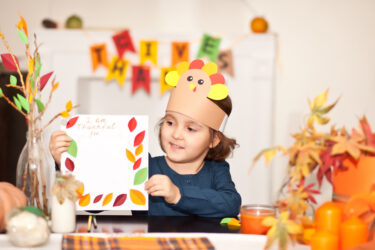The joys of the season can be laced with stress and anxiety, particularly for the blended family.
Kim and Craig Williams celebrate the holidays together as a blended family with Sam, 15 (Craig’s son from a previous marriage), Matthew, 9 (Kim’s son from a previous marriage) and their son, Logan, 19 months.
“It’s been an adjustment for everybody,” says Kim. Just working out all the logistics can be a real challenge for the family.
“We try to make everybody happy by planning times to celebrate with all the families involved, but then, we make it a priority to have Christmas Day as our time to be together and be our own family,” she adds.
Kim feels it’s best to try and keep things simple. For example, rather than attempting to address other family traditions or customs, Craig and Kim have found that starting their own traditions has worked for them.
“We do our own thing, and open our gifts Christmas morning,” Kim says. “Then we follow that with a nice family breakfast at home. We just spend the day together enjoying each other and it helps ease the stress of the holidays. The children can enjoy their gifts and not have to jump up and go somewhere else. They can count on that one day to be our special day.”
Be Flexible with the KIDS’ Needs
“It can be a juggling act to manage a normal two-household schedule,” says Sharon James, divorce and family mediator with Beech Acres Parenting Center, which offers parent and/or couples coaching and mediation. “Add to this child-care arrangements, visiting extended family members, vacations, celebrations, and you have quite the challenge. Advanced planning and communication is key. Send a list of your child’s activities — parties, child-care while out of school — to the other parent, along with the times that your family will be celebrating and ask to know their plans so you can create a holiday schedule that is confirmed well in advance and that works for everyone.”
It’s crucial for parents to be particularly sensitive to the needs of their children during the holidays. “This is not the time to insist on equal time down to the minute,” says James. “They are not going to remember that Dad had 30 minutes more with them on Christmas morning. They WILL remember if it created tension and conflict between their parents. Unanticipated snags in plans may mean you have to change things around a bit to accommodate. It is important to be respectful of planned events at your child’s other home and make sure that children are there on time; it is equally important not to make an issue of changes that will allow your children to enjoy the holiday.”
James also believes it’s a good idea for a blended family to start new holiday traditions. “Keep some family traditions from both sides,” she says. “A family meeting can help you brainstorm things you’d like to hang on to as well as ways to create new traditions that represent the union of your blended family. If you’ve always opened gifts on Christmas morning, but your step-children’s family opened them on Christmas Eve, do a little of each. Different ways to decorate a tree? Have two. There are no rules.” She also recommends that parents play to their family members’ strengths. “If your stepson enjoys hanging lights and your daughter is a creative gift-wrapper, place them in charge of those tasks. When children are making contributions and their talents are acknowledged and appreciated, they gain confidence and a sense of belonging — all key to the success of blending families.”
Kim Williams cites another problem blended families face — making sure that the gift giving is “as even as possible among the children, and that one doesn’t feel that another child gets more.” She adds, “You really have to work hard to make that happen, particularly when the children are getting gifts from other family members.”
James advises parents to be mindful of gift-giving messages. “What message do you want to convey to your kids about the meaning of the holidays? You may want to talk with one another about what the children have asked for and share in the cost of the bigger-ticket items and let them know that those gifts are from both Mom and Dad. If there are more gifts at one house than the other and your children comment on that, you might say ‘I am so happy that you enjoyed your Christmas with your mom/dad.’ You cannot change what happens in your ex-spouse’s home. You do have control over how you respond and keeping your child from being placed in the middle.”
Santa vs. the Dreidel: Blending Religious Views
Concerning the blending of religions, Neal King, Ph.D., professor of sociology at Belmont University, explains that if parents “do marry outside of their church — usually one spouse is not as devout as the other, and either converts or doesn’t really care how the holidays are celebrated.”
Also, he adds that children tend to follow their parents, “so the devout spouse leads the way, and the children naturally inherit the beliefs of the spouse who cares the most. In a way, this is good news.”
King says he feels that Christmas “means so many different things to so many different people, and this helps the blended family on that holiday, because Christmas is so open and wide — and elastic. It can be a holiday that suits most anybody.”
The Mayerson Foundation has developed a unique program for families with blended religious backgrounds, called Fusion Family. In addition to fun events for interfaith families to meet others, like Top Chef Tots or The Passover Free for All, Fusion Family also offers New Traditions, which contains free gifts to help parents and children explore Judaism and its role in their family life. Both interfaith and conversionary families receive free gifts of ritual items and resources to help them learn about and celebrate Jewish holidays. The Mayerson Foundation also offers Shalom Family for families with children ages 12 and younger in which one or both parents are Jewish. Shalom Family hosts large events throughout the year, along with Sensory Sunday, which are free playgroups for families with babies. Shalom Family also provides Shalom Baby Starter Kits.
Having a successful family life can be difficult these days for traditional, as well as blended families. Approaching the holidays with care and compromise is perhaps good advice for all of us, no matter what our family situation is. After all, learning how to get along by loving and respecting each other is what it is all about — whatever the season.
~ Melinda Richarz Bailey is a freelance writer.





